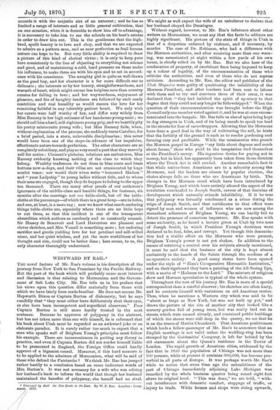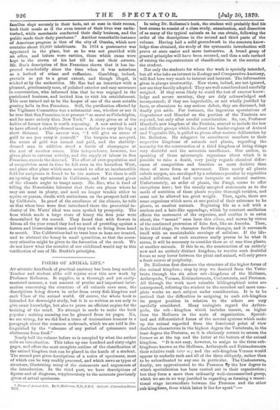WESTWARD BY RAIL.* THE novel feature of Mr. Rae's volume
is his description of the journey from New York to San Francisco by the Pacific Railway. But the part of the book which will probably cause most interest and discussion is that relating to Mormonism and the Govern- ment of Salt Lake City. Mr. Rae tells us in his preface that his views upon this question differ materially from those with which we have lately been made familiar. He does not accuse Mr. Hepworth Dixon or Captain Burton of dishonesty, but he says candidly that " they must either have deliberately shut their eyes, or else have been incompetent and superficial observers." Poor Captain Burton is still more hardly treated in the next sentence. Because he approves of polygamy in the abstract, but has not taken more than one wife himself, he is informed that his book about Utah must be regarded as an awkward joke or an elaborate paradox. It is surely rather too much to expect that a man who speaks well of Brigham Young's principles must follow his example. There are inconveniences in putting any theory iu practice, and even if Captain Burton did not render himself liable to be prosecuted in England, the Foreign Office could hardly approve of a bigamist consul. Moreover, if this hard measure is to be applied to the admirers of Mormonism, what will be said of those who defend the Patriarchs ? We think Mr. Rae has jumped rather hastily to a conclusion based on some indiscreet words of Mrs. Burton's. It was not necessary for a wife who was editing her husband's book to inform the world that though her husband maintained the benefits of polygamy, she herself bad no rival.
* Westward by Raid the New Route to the East. By W. F. Rae. mans, 1870.
We might as well expect the wife of an unbeliever to declare that her husband obeyed the Decalogue.
Without regard, however, to Mr. Rae's inference about other writers on Mormonism, we must say that the facts he adduces are highly significant. His picture of the state of things in Utah is that of a despotism enforced by violence, and if necessary, by murder. The case of Dr. Robinson, who had a difference with the Mormon authorities, and after receiving more than one warn- ing, was assassinated at night within a few yards of his own house, is chiefly relied on by Mr. Rae. But we also hear of the confiscation of property, of exorbitant fines being imposed to keep up a colour of legality, of the excommunication of those who criticize the authorities, and even of those who do not repress criticism. According to Mr. Rae, the editor and publisher of the Utah Magazine were guilty of questioning the infallibility of the Mormon President, and after teachers had been sent to labour with them and to try and convince them of their error, it was declared that " they had imbibed the spirit of apostacy to that degree that they could not any longer be fellowshipped." When the question of their excommunication was brought before the High Council onlyone member voted against it, and he was at once excom- municated into the bargain. Mr. Rae tells us also of spies being kept to dog strangers in Utah, and of its being unsafe to speak too loud in the streets for fear of eavesdroppers. Allowing that the Mormons have done a good deal in the way of cultivating the soil, he hints that the fertility of the ground is such as to render gardening and farming easy and profitable. While the missionaries who preach the Mormon gospel in Europe " say little about dogmas and much about farms," those who yield to the temptation find themselves at the President's mercy. His ingenious device for paying not in money, but in kind, has apparently been taken from those districts where the Truck Act is still evaded. Another remarkable fact is that while native-born Americans are in a minority among the Mormons, and the leaders are chosen by popular election, the choice always falls on those who are Americans by birth. The changes in the Mormon creed which have been introduced by Brigham Young, and which have entirely altered the aspect of the revelation vouchsafed to Joseph Smith, savour of that doctrine of development which naturally attends infallibility. If it be true that polygamy was formally condemned as a crime during the reign of Joseph Smith, and that certificates to that effect were signed by men and women of influence who are now among the staunchest adherents of Brigham Young, we can hardly fail to detect the presence of conscious imposture. Mr. Rae speaks with some authority, as he heard a lecture given at Utah by two sons of Joseph Smith, in which President Young's doctrines were declared to be foul, false, and corrupt. Yet though this denuncia- tion had a visible effect on the Mormons who were present, Brigham Young's power is not yet shaken. In addition to the means of retaining a control over his subjects already mentioned, it must be said that the business of the city is kept almost exclusively in the hands of the Saints through the medium of a co-operative society. A good many stores have been opened under the style of " Zion's Co-operative Mercantile Institution," and on their signboard they have a painting of the All-Seeing Eye, with a motto of " Holiness to the Lord." The mixture of religious show and Mormon speculation is typical of the whole system.
Throughout the rest of his journey Mr. Rae is more of a special correspondent than a careful observer ; his sketches are often hasty, and he contents himself with variations on old American stories. Thus, when he mentions a Western city which was said to be "about as large as New York, but was not built up yet," and draws the picture of the site of another city that looked like a nursery garden full of young trees, but was really laid out in streets which were named already, and contained public buildings of which the stones were still deep in the quarry, we see that be is on the traces of Martin Chuzzlewit. That American positiveness which leads a fellow-passenger of Mr. Rae's to announce that an English marriage is not valid unless the wedding-ring has been stamped by the Goldsmiths' Company, is left far behind by the old statements about the Queen's residence in the Tower of London. The rapid growth of American cities, evidenced by the fact that in 1830 the population of Chicago was not more than 100 persons, while at present it contains 300,000, has become pro- verbial in all parte of Europe. It was perhaps worth Mr. Rae's while to notice that some time ago the unhealthiness of the part of Chicago immediately adjoining Lake Michigan was remedied by the whole business quarter being raised eight feet above its original level. " This was done," we are told, " with- out interference with domestic comfort, stoppage of traffic, or London : Long- injury to trade. While houses and shops were rising upwards, families slept securely in their beds, sat at ease in their rooms, took their meals as if the even tenour of their lives was undis- turbed, while merchants conducted their daily business, and the public made their daily purchases." Another remarkable instance of American progress is that of the city of Omaha, which now contains about 20,000 inhabitants. In 1854 a postmaster was appointed in the place, but as he was not provided with an office, and letters were rarities, those which came were kept in the crown of his hat till he met their owners. Dir. Rae's description of San Francisco shows that it has im- proved wonderfully since the time when it was notorious as a hotbed of crime and ruffianism. Gambling, indeed, prevails as yet to a great extent, and though illegal, is winked at by the authorities. Mr. Rae had an interview with a pleasant, gentlemanly man, of polished exterior and easy assurance in conversation, who informed him that he was engaged in the pasteboard business, and invited him to visit his establishment. This man turned out to be the keeper of one of the most notable gaming hells in San Francisco. Still, the purification effected by the Vigilance Committee was a substantial one, whether or not it be true that San Francisco is at present " as moral as Philadelphia, and far more orderly than New York." A story given us of the habits of former times is worth repeating. A new arrival is said to have offered a shabbily-dressed man a dollar to carry his bag a short distance. The answer was, " I will give an ounce of gold to see you carry it yourself." The bargain was accepted, the ounce of gold was earned and paid, and the shabbily- dressed man in addition stood a bottle of champagne at the cost of another ounce. This independence, however, has given place to extreme activity, and the supply of labour in San Francisco exceeds the demand. The effect of over-population and of competition must in time be felt even in the boundless West, and place after place which once seemed to offer an inexhaustible field for emigrants is found to be too narrow. Yet there is still -an opening for agriculture in California, and the account given -of the climate ought to tempt many. Mr. Rae, who is fond of telling the Dorsetshire labourer that there are places where he may eat meat in plenty, and need no longer truckle either to -squire or parson, dwells with enthusiasm on the prospect held out by California. In proof of the excellence of the climate, he tells as that when bees were first introduced there the proverbial in- dustry of Dr. Watts' ideal was soon spoiled by prosperity. The bees which made a large store of honey the first year were
• demoralized by the second. They found that with flowers in bloom all the year round they had no need of providing against a • barren and blossomless winter, and they took to living from hand -to mouth. The Californians had to treat bees as hens are treated, and to abstract the honey in small quantities, so that the neces- sary stimulus might be given to the formation of the comb. We do not know what the moralist of our childhood would say to this verification of one of Mr. Buckle's principles.































 Previous page
Previous page